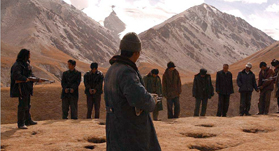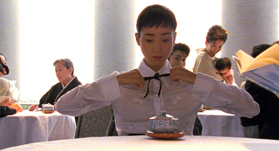
A village elder, in a remote and arid part of
The story quickly becomes a touching portrait of the love between the man and his wife, who is drawn into the scheme. Although their lives are not free of squabbles, their affection runs deep, and they channel that affection to helping each other with the sheep, who turn out to be picky little things. The struggle to make sense of the unfamiliar and picky breed gives rise to many comical situations.
The plot may be viewed as a humorous criticism of
the attempt to cast aside the locally-developed economy for the promise of
modernization and wealth. The methods tested for the specific local conditions
give way to awkward if sincere attempts at adaptation, often with disastrous
consequences. The grandiose Maoist scheme to “catch up with
KEKEXILI: MOUNTAIN PATROL (PRC)

Winner of
The film documents the chase after the poachers, conducted by a few local men willing to risk their lives. They work against all odds — no state funding or other income, murderous poacher gangs, snow storms and quicksand. Their own battle does not end well, but their persistence brings the matter to the attention of the authorities, which eventually set up a dedicated force.
Although the story is fictional, it is based on events
that took place in Kekexili in the 1990s. The film
joins other recent movies from the PRC (notably Platform, also shown
this year at SIFF) that are inspired by documentaries made on the topic —
in this case, Peng Hui’s Balance. Told from the viewpoint of a reporter, the film
continues the tradition of reportage literature and film focusing on China’s
wild western provinces, mostly unknown to Han Chinese until youth was forced
to go down to the countryside during the later phase of the Cultural Revolution
(1969-1976). Whereas recent films from the PRC have portrayed life in the
rapidly-modernizing metropolises on the eastern coastline, Two Great Sheep
and Kekexili: Mountain Patrol give
a picture of the less-accessible and often-neglected parts of

The story of a lonely illustrator whose life is briefly illuminated by the presence of a loving young wife, whose only fault is an insatiable desire for expensive clothing. Her sudden death leaves Tony yearning for her, yet the only way in which he can recreate her presence is through the room-full of clothes.
The film provides a deadpan parody on the Japanese craze for brand-name products and designer clothing. Rather than lingering on platitudes about consumer society, the film explores the emotional value of such irrational amassing of goods, from an intense interest in the aesthetics of daily life to the way in which objects can become our link to an otherwise-inaccessible painful memories. In an especially well-constructed shot, the camera pans slowly through a rack of jackets; as each piece comes into focus, the fabric is seen in all its richness, only to become blurry again and fade away.
The film is based on Haruki Murakami’s short story of the same title, available on line in Jay Rubin’s translation (http://magna.cs.ucla.edu/~hxwang/newyorker/blog/files/tonytakitani.html). Murakami’s style is hard to capture in film, and few works of the popular and prolific author have been adapted to the screen. The film director chooses a particular style that matches Murakami’s writing — short vignettes, told by a voice-over narrator whose lines are often picked up by the characters.